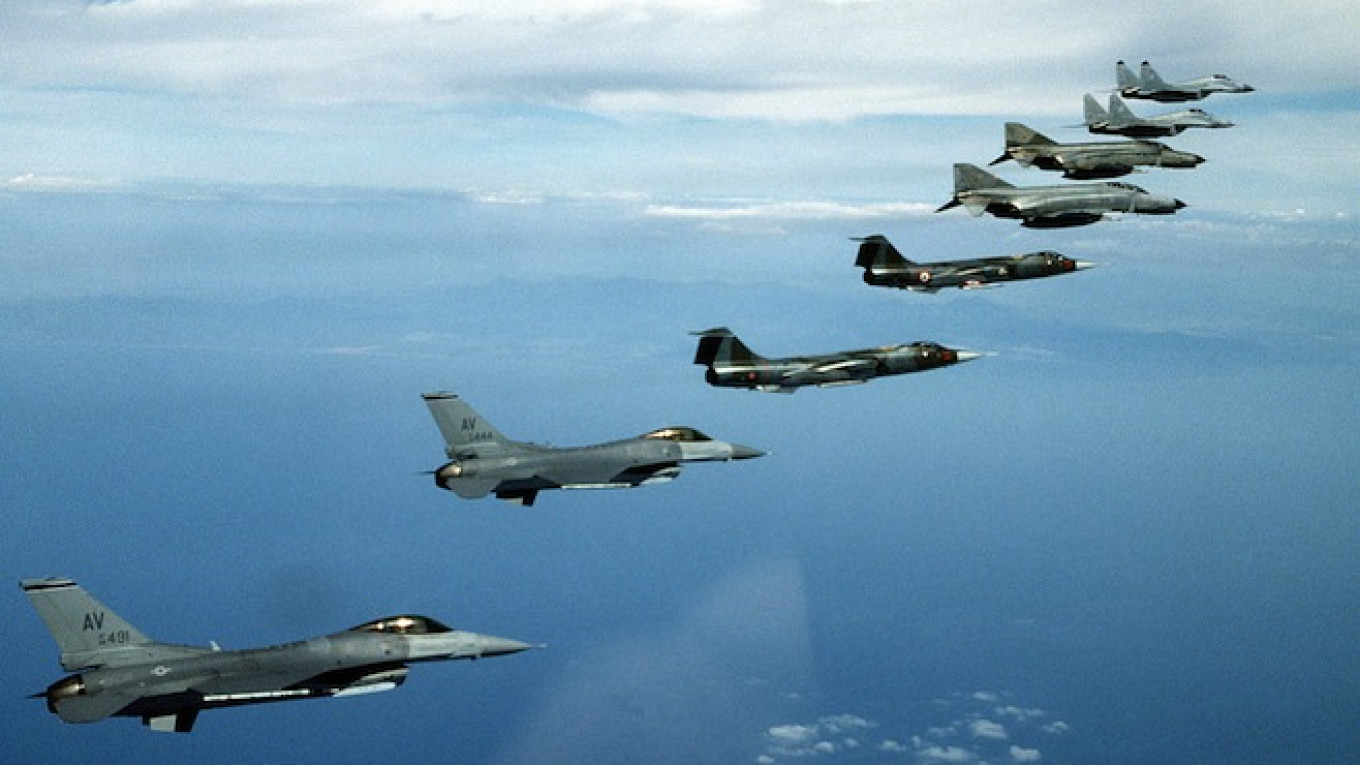The NATO military alliance will reduce in September the number of planes patrolling Baltic skies on the lookout for Russian bombers by 50 percent amid a moderate decrease in Russian bomber and fighter jet incursions along alliance airspace in the region, a NATO representative told The Moscow Times on Wednesday.
“Our military commanders assess that this posture is appropriate and adequate,” NATO deputy spokeswoman Carmen Romero said in e-mailed comments from Brussels on Wednesday.
NATO began flying aerial patrols over the three Baltic nations of Estonia, Latvia and Lithuania when the post-Soviet states joined the alliance in 2004. Since the start of the Ukraine crisis in early 2014, the size of NATO's air contingent in the Baltic had increased from four to 16 aircraft.
But according to Romero, 16 aircraft exceeds the alliance's military requirement for securing Baltic airspace, and the size of the force will be downgraded to eight aircraft.
“This is double the number we had before the start of the Russia-Ukraine crisis,” she added.
NATO says its decision to adjust the force strength of its Baltic Air Policing mission does not represent “a change in our signal to Russia,” a NATO official said in written comments sent to the Moscow Times by the NATO press office.
The alliance remains committed to defending the Baltic from potential Russian aggression, the official said. “I would call it a technical adjustment more than anything else. There will be no reduction in our level of vigilance of the Baltic Air Space,” the official added.
Douglas Barrie, an expert on the Russian military at the London-based International Institute for Strategic Studies think tank, told The Moscow Times that “the increase in the number of aircraft dedicated to the Baltic Air Policing mission was intended as a gesture of reassurance, and in practical terms stepping down to a deployment level is still adequate to meet the mission task.”
Baltic Air Policing
Prior to the flaring up of tensions between Russia and the West over Moscow's annexation of Crimea from Ukraine and subsequent support for pro-Russian rebels in eastern Ukraine, just four aircraft patrolled Baltic skies as part of NATO's Baltic Air Policing mission.
Last spring, NATO decided to double the size of the patrol force to eight aircraft. Meanwhile, the Kremlin began sending its bombers and aircraft on provocative patrols along alliance airspace across Europe, with a particular focus on the Baltic region.
Alliance members offered up an additional eight aircraft, which NATO accepted, bringing the force to 16 last summer.
The Baltic force is staffed on a rotational basis by Eurofighter Typhoon fighters from Germany, Italy, Britain and Spain, F-16 fighters from Belgium, the Netherlands and Norway, and sometimes Russian-built MiG-29s from Poland.
Gareth Jennings, aviation desk editor at the IHS Jane's military publication, said it was difficult to see the decision to reduce the number of patrol aircraft from 16 to eight as anything other than a reduction, “which is curious given that only days ago the alliance was making a big deal out of record interceptions of Russian aircraft being conducted in the Baltic region.”
In 2014, NATO aircraft were scrambled 442 times to intercept Russian aircraft all along Europe's airspace boundaries — a significant increase over previous years, NATO's press office cited one official as saying in e-mailed statements. One hundred and fifty intercepts took place in the Baltic region.
The official said that in the first six months of this year, NATO fighters were scrambled 250 times in response to Russian aerial activities, but that “regionally, we have observed a moderate decrease in Russian air activity over the Baltic and North seas compared to the first half of last year.”
A recent spate of Russian air force crashes may be partially responsible for the downturn in intercepts over the Baltic. Since the beginning of June, Russia has lost eight airplanes during routine training exercises.
Analysts told The Moscow Times in July that this was likely due to the increased operational tempo of Russia's air force amid the Ukraine crisis. Planes like the iconic propeller-driven Tu-95 “Bear” bombers were all built in the Soviet Union, and they are now flying longer and more often than at any point since the end of the Cold War: The old birds might be wearing out.
At the same time, according to NATO, there has been a significant increase in Russian air activity over the Black Sea in the first half of this year compared to the same period in 2014.
Contact the author at m.bodner@imedia.ru
A Message from The Moscow Times:
Dear readers,
We are facing unprecedented challenges. Russia's Prosecutor General's Office has designated The Moscow Times as an "undesirable" organization, criminalizing our work and putting our staff at risk of prosecution. This follows our earlier unjust labeling as a "foreign agent."
These actions are direct attempts to silence independent journalism in Russia. The authorities claim our work "discredits the decisions of the Russian leadership." We see things differently: we strive to provide accurate, unbiased reporting on Russia.
We, the journalists of The Moscow Times, refuse to be silenced. But to continue our work, we need your help.
Your support, no matter how small, makes a world of difference. If you can, please support us monthly starting from just $2. It's quick to set up, and every contribution makes a significant impact.
By supporting The Moscow Times, you're defending open, independent journalism in the face of repression. Thank you for standing with us.
Remind me later.






